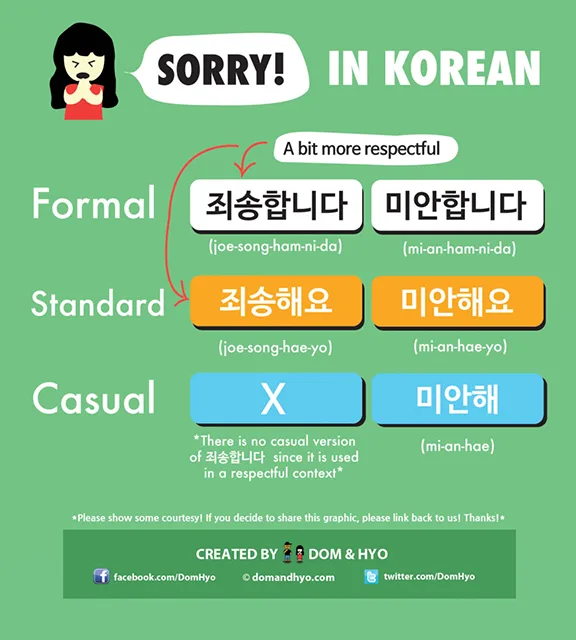
Another important phrase you should learn to say in Korean is “I’m sorry.” You will need this in your arsenal if you visit Korea because 9 times out of 10, you will bump into someone in the crowded streets at some point and need to apologize.
Or you may be in an argument with your Korean SO or friend. Knowing how to write or say sorry would be very beneficial!
As seen in the graphic, there are two ways you can say sorry (like many other phrases in the Korean language). You can learn to say these easily even if you think your Korean is bad/terrible.
The first way “죄송합니다” is used when you want to be the most respectful in your apology. For example, if you mistakenly bumped into someone on the street, saying this would be better than 미안합니다 although you wouldn’t be totally rude for saying it. Both of these are the formal ways of saying sorry.
Below, you can see the standard and casual versions. Even though 죄송해요 is used, it is still better to use the formal version more often than not. 미안해요 is frequently used among casual friends an coworkers.
A simple 미안해 is good enough for kids and people who are around the same age as you. This is also frequently shortened to just 미안 with people who are extremely close to you and in a casual situation.
Also note the romanized version of 죄송…
The sound ㅚ and its romanized version have always bothered me as it looks and sounds like “o”.
So the “joe” in the romanized version is not pronounced like the name Joe, but more of a “jweh” sound.
Vocabulary in this graphic:
Formal:
죄송합니다 (joe-song-ham-ni-da)
미안합니다 (mi-an-ham-ni-da)
Standard:
죄송해요 (joe-song-hae-yo)
미안해요 (mi-an-hae-yo)
Informal/Casual:
미안해 (mi-an-hae)
